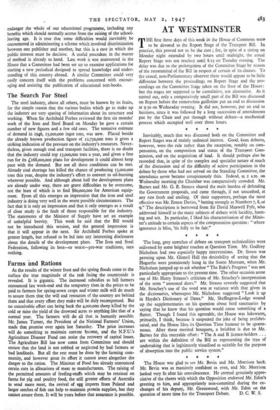Farms and Rations
As the results of the winter frost and the spring floods come to the surface the true magnitude of the task facing the countryside is revealed. It is gigantic. The increased subsidies to hill farmers announced last week-end and the temporary rises in the prices to be paid to farmers for spring-sown crops and winter milk will do much to assure them that the will and resources of the country are behind them and that every effort they make will be duly recompensed. But no conceivable effort can bring back the 4,000,000 sheep killed by the cold or raise the yield of the drowned acres to anything like that of a normal year. The farmers will do all that is humanly possible. Mr. James Turner, the President of the National Farmers' Union, made that promise over again last Saturday. The price increases will do something to maintain current tncome, and the N.F.U.'s Agriculture Disaster Fund can assist the recovery of capital losses. The Agriculture Bill has now come from Committee and should ensure that the land is not robbed or neglected by bad farmers or bad landlords. But all the rest must be done by the farming com- munity, and however great its effort it cannot avert altogether the danger to the ration. The Minister of Food has already announced cerain cuts in allocations of meat to manufacturers. The raising of the permitted amounts of feeding-stuffs which may be retained on farms for pig and poultry food, the still greater efforts of Australia to send more meat, the revival of egg imports from Poland and larger catches of fish can help to maintain protein supplies, but they cannot assure them. It will be years before that assurance is possible.


































 Previous page
Previous page